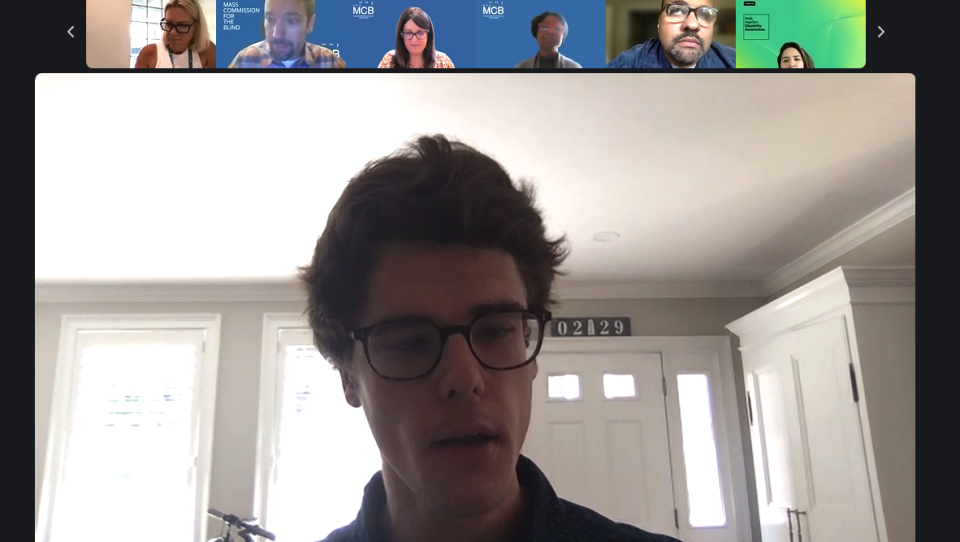Innovative ‘reverse’ job fair helps blind job seekers in Mass. connect with employers
October 11, 2024

When Nicole Young was diagnosed as legally blind 12 years ago while working at a security company, she knew she had to make a career pivot.
“All the career goals and everything I had for myself had to completely change,” Young said.
She already had a master’s degree in criminal justice and eventually got another master’s degree in education, leading her to start working as a paraprofessional and supporting teachers in local high schools and preschools.
Young was one of the participants in the Massachusetts Commission for the Blind’s “reverse job fair,” a two-part virtual event on Sept. 27 and Oct. 10. Employers from across the state listened to job seekers deliver a two-minute pitch, one at a time, about themselves over Zoom. About 40 job seekers pitched themselves to 30 employers across the two days.
The event flipped the usual career fair process and focused on helping blind job seekers launch their careers — which is often the hardest part, said Carol Cullins, the commission’s employment services supervisor.
“One of the biggest challenges that we find [for] individuals with visual impairment [is] getting that first job opportunity,” Cullins said “So, with the reverse job fair, the job seekers take the spotlight.”
In their pitches, the job seekers talked about their prior experiences, including designing marketing campaigns, owning a music store, leading arts programs for kids and creating accessibility apps. Some were recent college graduates while others had years of experience. They were looking for jobs in fields including office administration, customer services, cyber security, education and mental health services.
In her pitch, Young focused on her strengths: she’s hardworking, dependable and willing to go the extra mile. She has applied to a variety of jobs in education and customer service, and says she has already received several interview requests since participating in the job fair, including a sales associate job at Home Depot.
According to the Bureau of Labor Statistics, the unemployment rate for people with a disability is 7.2%, double the rate for those without a disability, at 3.5%. And according to the U.S. Census Bureau’s American Community Survey, 44% of people who are blind or visually impaired are employed, compared with 79% of workers without any disabilities.
Young and other job seekers say that misunderstandings about blindness and disabilities can make the job search process difficult.
“When I do disclose that, I do notice that they [employers] ask, ‘what exactly does legal blindness mean?’ There seems to be a lack of knowledge about it,” Young said.
Blindness can be a spectrum with various causes. Being “legally blind” means that a person meets certain criteria, including having 20/200 or worse eyesight even with corrective lenses. According to the CDC, more than 1 million Americans meet that definition.
Owen Devlin, a recent college graduate who is legally blind, said that he has had some experience with discrimination in the past.
He was glad to participate in the unique event as a way to “get my name out there and really speak to candidates who are looking to hire people,” he told GBH News. “And I also thought it was a great opportunity to really network as well.”
He’s looking for a job in journalism, communications or customer service. During his two-minute pitch, he highlighted his passion for writing and experience working in TV production.
According to state and federal laws, employers must provide “reasonable accommodations” for an employee with a disability to perform their job.
“For the employer on their end, I think being really open and really understanding and … being willing to put accommodations in place for their employee is really important,” Devlin said.
Working with blind employees is a learning process that can be beneficial for everyone, according to Rosalie Rippey, director of development and communications at the Federation for Children with Special Needs, an organization that participated in last year’s job fair.
Last year, Rippey hired an employee who is legally blind who she says ended up being a “perfect” fit for an administrative role. Rippey worked with the commission and the employee to get accommodations set up, such as making sure her screen reader worked with the organization’s software, as well as more low-tech solutions like showing her how to navigate the office space and putting tactile dots on the microwave in the break room so she knows which buttons to press.
“I think a lot of times with disability, it’s the lack of imagination on the part of the employer rather than any kind of deficit in the job seeker that’s the problem,” Rippey said.
“I learned that I could just talk to her [the employee] about what accommodations will make something work for her,” she added.
The job fair was previously an in-person event, but pivoted to a virtual format after the pandemic. The commission found that the virtual format was particularly suited for blind job seekers who don’t drive or may have a hard time getting to an in-person event.
The commission’s Carol Cullins said there “seems to be a lot of enthusiasm among employers” and that they often reach out to her with excitement when trying to connect with a job seeker.
October is National Disability Employment Awareness Month and she hopes more connections can continue.
“People who are legally blind are very adaptable in their daily lives. The skills that they have translate into creative problem solving and resilience, which can greatly benefit any workforce,” she said. “But, despite their many strengths, people who are legally blind remain very underutilized in the labor market today.”